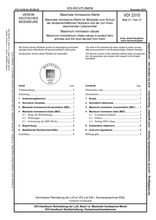Standards Worldwide
Standards Worldwide
Phone +49 30 58885700-07

Technical rule [CURRENT]
VDI 2310 Blatt 37:2015-11
Maximum immission values - Maximum molybdenum intake values to protect farm animals and the food derived from them
- German title
- Maximale Immissions-Werte - Maximale Immissions-Werte für Molybdän zum Schutz der landwirtschaftlichen Nutztiere und der von ihnen stammenden Lebensmittel
- Publication date
- 2015-11
- Original language
- German, English
- Pages
- 10
- Publication date
- 2015-11
- Original language
- German, English
- Pages
- 10
Product information on this site:
Quick delivery via download or delivery service
Buy securely with a credit card or pay upon receipt of invoice
All transactions are encrypted
Short description
Molybdenum is an essential heavy metal. Toxic effects of molybdenum in cattle were described for the first time in 1938. The maximum immission values (MI values) for molybdenum listed in this standard are designed to protect farm animals and the food derived from them. Maximum immission values for molybdenum have been calculated on the basis of the results of livestock feed trials. In these experiments, the animals received fodder to which sodium or ammonium molybdate had been added or whose sodium or ammonium molybdate content was naturally high or elevated as a result of ambient air pollution. MI values can thus be specified only for those animals for which corresponding data is available. In this case cows, young cattle, beef cattle, sheep, goats, horses, fattening pigs and broiler hens. Reductions in performance, reproductive disorders, impairment of health and biochemical changes were the criteria used to determine the effect of molybdenum on farm animals. This standard applies in particular to all people who directly and indirectly handle or come into contact with farm animals and the food products derived from them. The standard is part of the series of standards "Maximum immission values to protect farm animals and the food derived from them". That regards pollutants for which generally there is no animal feed regulation.
Content
ICS
13.040.20,
65.020.30
Replacement amendments
This document replaces VDI 2310 Blatt 37:1998-04 .
Also available in
Loading recommended items...
Loading recommended items...
Loading recommended items...
Loading recommended items...
